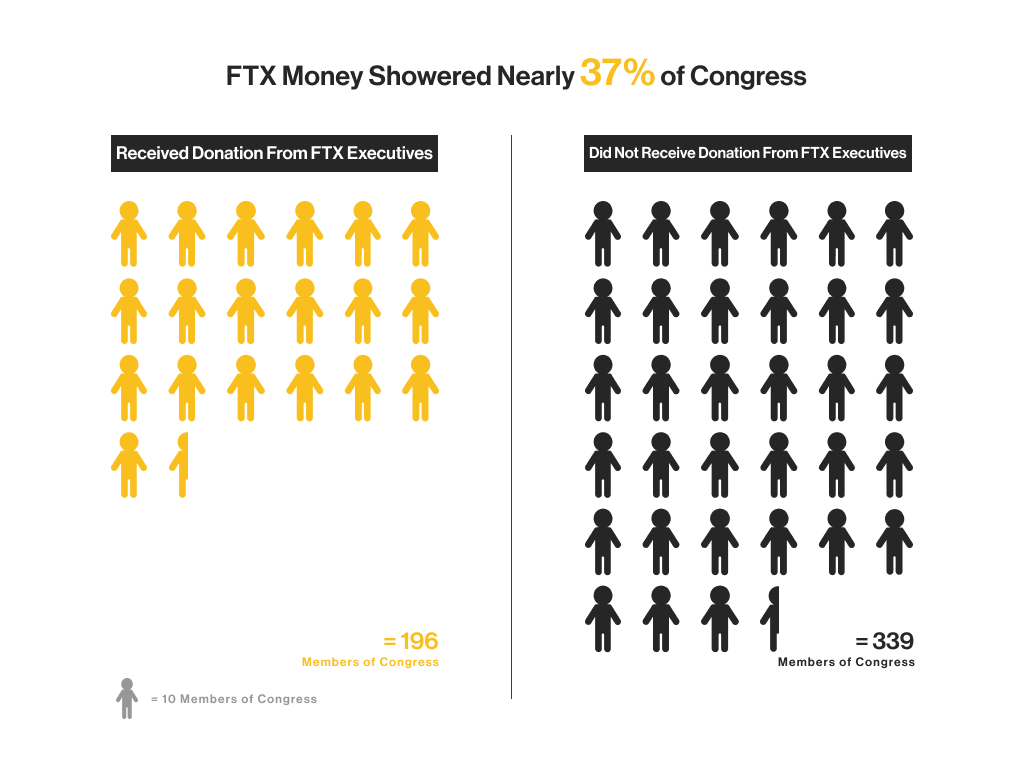Congress’ FTX Problem: 1 in 3 Members Got Cash From Crypto Exchange’s Bosses
The session began with 196 U.S. lawmakers who took direct contributions from Sam Bankman-Fried and other former FTX executives, and many of them are still trying to get rid of it.
More than one in three of the 535 senators and representatives in the U.S. Congress showed up to the new session with FTX baggage, having received campaign support from one of the senior executives of the fraud-ridden crypto giant.
CoinDesk has identified 196 members of the new Congress – many of whom were just sworn in last week – who took cash from Sam Bankman-Fried or other senior executives at FTX, a crypto exchange that filed for bankruptcy in Delaware in November after CoinDesk revealed unusually close ties between FTX and Alameda Research, an affiliated hedge fund. The names in Congress range from the heights of both chambers, including new Speaker of the House Kevin McCarthy (R-Calif.) and Senate Majority Leader Chuck Schumer (D-N.Y.), down to a list of recipients new to high-level politics.
After the lawmakers received the money, it became clear – according to the work of journalists, the criminal charges and admissions of guilt from FTX insiders – that the funds sprang from this colossal financial swindle. CoinDesk reached out to all 196 lawmakers to ask what they would do with the money.
Most of the politicians who responded said they handed it over to charities to remove the taint of contributions from executives such as former FTX CEO Bankman-Fried, whose federal fraud charges also include an accusation that he violated campaign-finance laws. Others have revealed they had conversations with the U.S. Department of Justice about setting aside the money until it can be dropped into a fund to compensate FTX victims.

Rep. Lou Correa (D-Calif.) was among dozens of current or incoming members of Congress who took FTX contributions, in his case the full limit of $2,900 directly from Bankman-Fried.
“I don’t know the gentleman – never talked to him,” Correa told CoinDesk. But Correa said he intended to donate that same amount to his alma mater, California State University, Fullerton, “to support their Dreamer education fund.”
Charitable contributions
Of the 53 campaigns that responded on the record, 64% decided to forward the donated amounts to nonprofit causes.
Incoming Rep. Greg Casar (D-Texas) planned to forward contributions from an FTX executive and Bankman-Fried’s brother to the advocacy group Fight Corporate Monopolies, while Rep. Ronny Jackson (R-Texas) said he would give to a “crisis pregnancy center” back home because, a spokeswoman said, he “believes these funds should be donated to a worthy cause, given the information that has come to light about FTX and its leaders.”
However, the campaigns channeling tainted money to favored charities may not escape the reach of FTX’s bankruptcy case. And even the organizations they give to could be roped in.
“Making a payment or donation to a third party (including a charity) in the amount of any payment received from a FTX contributor does not prevent the FTX debtors from seeking recovery,” FTX warned in a December statement. The company is now controlled by CEO John Ray III, whose primary job is to recover money for the company’s fleeced creditors, though it isn’t yet clear whether political donations – nominally made directly from the individual’s personal accounts – will be subject to clawbacks.
The company said it’s inviting any recipients of donations from FTX executives to return the money soon, according to the statement. If the money was stolen, it was never theirs to give. Several of the campaigns told CoinDesk that they’re in touch with the bankruptcy team or government authorities and are trying to determine how to give the money back.
“We have received guidance from the Department of Justice that dollars received from FTX executives should be set aside for when a victims’ compensation fund is created in the future,” said Chris Carroll, campaign manager for Rep. Rosa DeLauro (D-Conn.), whose campaign accepted a contribution from Nishad Singh, one of the executives who contributed millions last year.
The current chaos at FTX means giving the money back is easier said than done. Of the recipients who responded to CoinDesk’s inquiries, 38% said they were holding the money and waiting for guidance on how to give it back. Only five politicians said they had already successfully returned the money.



